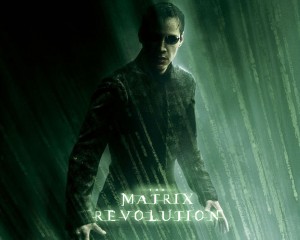
What we were trying to achieve with the story overall was a shift, the same kind of shift that happens for Neo, that Neo goes from being in this sort of cocooned and programmed world, to having to participate in the construction of meaning to his life. And we were like, ‘Well, can the audience go through the three movies and experience something similar to what the main character experiences?’
So the first movie is sort of classical in its approach, the second movie is deconstructionist and an assault on all the things you thought to be true in the first movie…and the third movie is the most ambiguous, because it asks you to actually participate in the construction of meaning.
To summarize:
The Matrix – Classical, i.e. Joseph Campbell’s Hero’s Journey
The Matrix Reloaded – Deconstruction, tears apart what we thought we knew based on the first movie.
The Matrix Revolutions – Re-Construction, but from a personal point of view.
My thoughts. Nine years on, I’ve become frustrated with where the trilogy went, and now it is clear to me why. I just hadn’t been able to put my finger on it until they explained it. This makes it clear.
This means that the first film was the construction of the hero, who goes on the same sort of journey that Luke Skywalker went on. The major difference is that, while Luke lost his mentor, Neo saved his. I’m wondering if that’s where the deconstruction actually began…
The second film, being deconstructionist, tore apart everything that we thought we knew to be true. That could be why a large percentage of the audience seems to hate the sequels. They didn’t stay true to the setup of the first film, and were a betrayal of the rules put into place. Instead of Morpheus returning to Zion as a hero, he returned as a social pariah who believed a prophesy that was established to be true by the events of the first film. Neo also can’t seem to understand his role as the One, and rather than being shown doing his thing as The One, is instead displayed as someone that is questioning (somehow, inexplicably) something he shouldn’t have to question. Especially since he witnessed, took part in, and experienced the change that he did in becoming The One. Because of the deconstruction concept that the Wachowskis wrote, we lost momentum. The kind of momentum that The Empire Strikes Back did for Luke Skywalker, we didn’t have with Neo.
The third film then returns us to the realm of the first. Neo was finally being Neo again. The idea that the Wachowskis wanted to make something that ambiguous, which left people feeling betrayed once more, is a good explanation for why. Because we had finally gotten to the epic final battle with Agent Smith, and everything was going great, and then we get to the end of the fight (which should have been extraordinarily simple for The One after the first film). Neo should have just been able to fly through all of the Agent Smiths, but thanks to the explanation that he gave us early in Reloaded: “Upgrades,” we didn’t have the opportunity. Somehow the rogue Agent Smith got the same upgrades that the other agents received. Okay, we’ll except that, this battle is awesome. But the end of the fight… Neo has been beaten. Our hero has been so terribly beaten that now he’s going to sacrifice himself. What was the point of the battle then? That was the plan the whole time? To get Agent Smith riled up when all he wanted to do was exactly what he did? “Because I choose to.” That line was weak at best, and told the audience that we’re not going to be getting the heroic ending that we were promised. Instead, we have to figure out for ourselves if Neo was successful. Was peace between non-feeling robots that just happen to have artificial intelligence and human beings like us the outcome that we wanted? Could we accept that there would be peace between the humans and the machines? Did anyone else notice that the trilogy actually ended with machines talking to machines about the deal?
Well, it was about re-construction, bringing Neo back to the point he was at the end of the first film, now that he’s come to grips with that position, but by now he can’t even wield it to the full potential, and in the end, he chooses peace. This is weak because at any time one side could decide to take down the other. There is no finality, no closure, and that is why the personal point of view is a problem. Ironically, ABC’s Lost provided an ending that was not only not ambiguous, but very clear on what happened, and I (like half of America) loved it. People love closure. The people that didn’t find closure in the end of Lost were looking for answers to many of the mythology questions that weren’t actually important to the story that was being told: the story of the people. The mythology was just in place to give the world they inhabited a lot more depth. Returning to The Matrix… the lack of closure for anyone took people by surprise. At least those that saw it. I’ve read so many times that people stopped at Reloaded. The deconstruction of the hero, it shows, was a bad idea.
